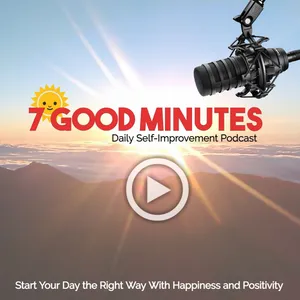Podcast Summary
Good stress vs bad stress: Good stress, or eustress, can improve performance, promote growth, and have anti-aging effects. Distinguish between stressors and stress, face stressors with positive emotions, and focus on stress' benefits for better coping and thriving.
Stress is not all bad. There are different types of stress, and while chronic stress can be harmful, brief and manageable stressors can actually benefit us. This good stress, also known as eustress, can improve performance, promote growth, and even have anti-aging effects. It's important to distinguish between stressors, which are external challenges, and stress, which is our internal response to those challenges. When we face stressors with positive emotions, such as enthusiasm or gratitude, we can reduce the risk of toxic stress and improve our ability to cope. Additionally, having a positive mindset towards stress and focusing on its benefits can create a self-fulfilling prophecy, helping us to better manage and even thrive in stressful situations.
Shifting mindset during stress: Focusing on hope, positivity, and challenge orientation can lead to better stress management. Practice self-talk, perspective-taking, and self-compassion to shift mindset.
Our response to stress plays a significant role in how our body reacts. While it's natural to feel anxiety and worry during stressful situations, holding onto hope, positivity, and a challenge orientation can lead to better outcomes. This mindset, also known as a challenge orientation, is distinct from a threat response, where we feel our life is in danger or a challenge exceeds our ability to cope. Practically, this means focusing on self-talk, perspective-taking, and self-compassion to help shift our mindset during stressful moments. Additionally, chronic stress, which can be low-grade and persistent, can have long-term negative effects on our health, even during rest and recovery periods. It's essential to assess our rest habits and ensure we're truly giving our bodies a break.
Practicing true rest goes beyond physical relaxation: Identify and release mental and emotional stressors through gentle techniques, anchor body with sensory experiences, and build inner traits of calm and resilience for better coping skills
True rest goes beyond just physical relaxation and involves addressing mental and emotional stressors. Our bodies carry tension and uncertainty, which we can identify and release by acknowledging our feelings of uncertainty and expectations. Over time, practicing simple, gentle techniques like comfort, reassurance, and relief in the present can help build inner traits of calm and resilience, allowing us to better cope with challenges without getting overwhelmed. Our bodies respond to signals of safety and can be anchored through sensory experiences like nature, aromatherapy, dimming lights, and music. At a cellular level, these practices can positively impact our well-being by promoting a sense of safety and reducing stress.
Two primary motivational forces: fear and anxiety vs love and self-compassion: Short-term stress, like exercise or breathing practices, can trigger autophagy for cellular rejuvenation, but recovery and tolerable discomfort are crucial for health benefits and growth.
Our bodies have two primary motivational forces: fear and anxiety, which help us protect our safety, and love, connection, and self-compassion, which allow us to turn off our stress response and restore our cells. Short-term bursts of manageable stress, like exercise or intense breathing practices, can have positive effects on our bodies by triggering autophagy, a cellular cleanup process that rejuvenates cells and makes them function better. However, it's important to recover from these stressors and ensure that the discomfort level is tolerable to avoid re-traumatization or triggering. Personal experimentation is key to finding the right dose and frequency of these stressors for individual health benefits. Additionally, succeeding at experiences that cause moderate stress can lead to growth and resilience.
Exploring the Benefits of Positive Hormetic Stress: Finding the right balance of challenge and confidence can lead to positive hormetic stress, resulting in improved well-being through various intense experiences, such as challenging workouts, flow states, extreme breathing, and cold showers.
There are various types of intense experiences, some of which may not feel stressful at the moment but still have beneficial lasting effects. These experiences can be physical, such as the last repetitions of a challenging workout, or psychological, like the flow state achieved during rock climbing. The key is finding the right balance of challenge and confidence, which can lead to ideal positive hormetic stress. This concept can be applied to practices like extreme breathing or cold showers, where trust and belief in the benefits are essential. The Wim Hof method, for instance, can be challenging but also leads to increased joy and positive emotions afterwards. Overall, embracing discomfort and trusting in the benefits can lead to significant improvements in well-being.
Streamlined Skincare Routine with OneSkin's OS Peptide: OneSkin's OS peptide offers a simple, scientifically validated solution for maintaining healthy skin with just one product. Build a sense of safety in emotionally vulnerable situations for potential wellbeing benefits.
Simple, scientifically validated solutions can make a significant difference in maintaining healthy skin. OneSkin's proprietary OS peptide, proven to work with aging cells, offers a streamlined routine with just one product: their os01 face topical peptide. Just cleanse, dry, and apply twice daily. For overall health information, check out the ZOE Science and Nutrition podcast, a trusted resource for separating fact from fiction. Moreover, intense positive emotions, such as those experienced during vulnerable open self-expression with another person, can potentially have a protective and even turbocharging effect on our wellbeing. It's essential to build a sense of safety in such situations. The concept of predator and prey, as illustrated in the metaphor of a lion chasing a gazelle, can be applied to various stressors, including physical activity and emotional experiences. While we may experience some level of stress or existential threat, the key difference lies in our mindset and intention. Lastly, it's important to note that the release of cortisol, which is often associated with stress, can also occur during positive experiences, such as dancing at a wedding. So remember, the stress response is not always a negative thing, and it's crucial to consider the context in which it occurs.
Understanding Stress: Physiological vs. Psychological: Physiological stress isn't always negative, but psychological stress can lead to negative consequences. Embrace positive emotions and learn to cope with uncertainty for effective stress management.
Stress and non-stress are not solely determined by arousal levels, but rather by the presence or absence of negative affect. For instance, skiers may experience physiological stress due to the release of various stressors in their bodies, but they might not feel psychologically stressed if they are excited and anticipating rewards. It's essential to understand the difference between physiological and psychological stress, as the former can lead to positive experiences like thrill and flow states, while the latter can result in negative consequences such as allostatic load. Furthermore, some negative emotions can be helpful, and it's crucial to consider the specific emotions involved in different stress states. In today's world, dealing with uncertainty and learning to accept it is crucial for managing stress effectively. The natural process of coping with adversity involves waves of hope, resilience, purpose, and sadness. Embracing positive emotions and focusing on hope can help us navigate through challenging times.
Finding meaning and connection in a chaotic world: Accepting the things we cannot control, focusing on local actions, tolerating helplessness, and connecting with others can promote positivity, purpose, and resilience in the face of existential stressors and uncertainty.
Finding meaning and connection, whether through inner work or community, can help us cope with existential stressors and the uncertainty of the world around us. Accepting the things we cannot control and focusing on what we can do in our local spheres can promote a sense of purpose and positivity. Tolerating helplessness and recognizing the importance of connecting with others, especially in the context of climate change and social justice issues, can also provide relief from stress and foster resilience. Ultimately, finding common ground with others and working towards a greater good can give us a sense of belonging and hope in the face of adversity.
Cultivating connection, ease, and acceptance for stress management: Practicing daily rituals, finding connection, and accepting uncertainty can help manage stress and maintain mental well-being. These skills can have a profound impact on individuals and communities.
Having a sense of common purpose and connection with others, as well as the ability to find ease and equanimity, are crucial for managing stress and maintaining mental well-being. These practices, which can include daily rituals and letting go of unnecessary burdens, are essential for individuals and can have a profound impact on a larger scale. However, it's important to acknowledge that not everyone shares this perspective, and catastrophic narratives can create additional suffering and stress. It's essential to recognize that our narratives shape our perception and coping mechanisms, and the ability to accept uncertainty and be at peace with it can be a valuable skill. Ultimately, cultivating a sense of connection, finding ease, and acknowledging uncertainty can help individuals navigate the challenges of life and contribute to a more compassionate and resilient community.
Change your response to stressors: Focus on changing how you react to stressors instead of eliminating them. Embrace a challenge approach and build resilience through manageable stress exposure. Accept uncertainty and stay present to reduce negative stress impact.
While chronic stress is linked to numerous health issues, it's essential to recognize that stressors are an inherent part of life. Instead of trying to eliminate stressors entirely, focus on changing your response to them. A positive approach to stress, known as a challenge approach, can even have beneficial effects on the body through a process called apoptosis. This involves exposing yourself to manageable doses of stress to build resilience. Additionally, accepting uncertainty as a natural part of life and staying present can help reduce the negative impact of stress. It's also important to remember that much of our stress comes from dwelling on past or future stressors, which we cannot change. Practices like meditation can help bring us into the present moment and reduce overall stress levels.
Finding meaning and true rest for managing stress and existential dread: Connecting actions to something larger for meaning and actively disengaging from work and screens for true rest are crucial for managing stress and existential dread. Technology can't replace restorative practices.
Finding meaning and purpose, as well as practicing true rest, are essential for managing stress and coping with existential dread. Meaning can be found in connecting our individual actions to something larger, like a movement or a cause we care about. True rest, on the other hand, means actively disengaging from work and screens, allowing the brain to metabolize experiences and rejuvenate. While technology can provide pleasure and distraction, it's not a substitute for restorative practices. Alyssa's new book, "The Stress Prescription," offers more insights on these topics and provides practical steps for achieving joy and ease in daily life. Remember to subscribe to the podcast, leave a positive review, and consider supporting it on Patreon for bonus content.






